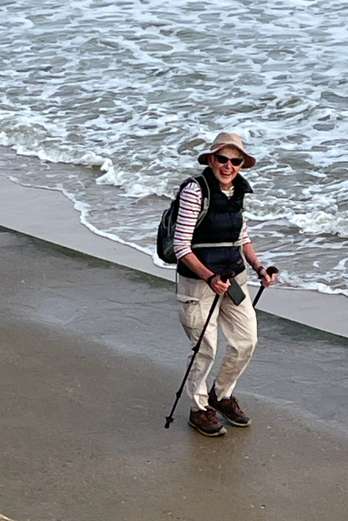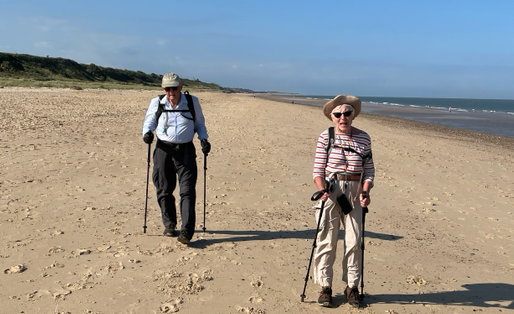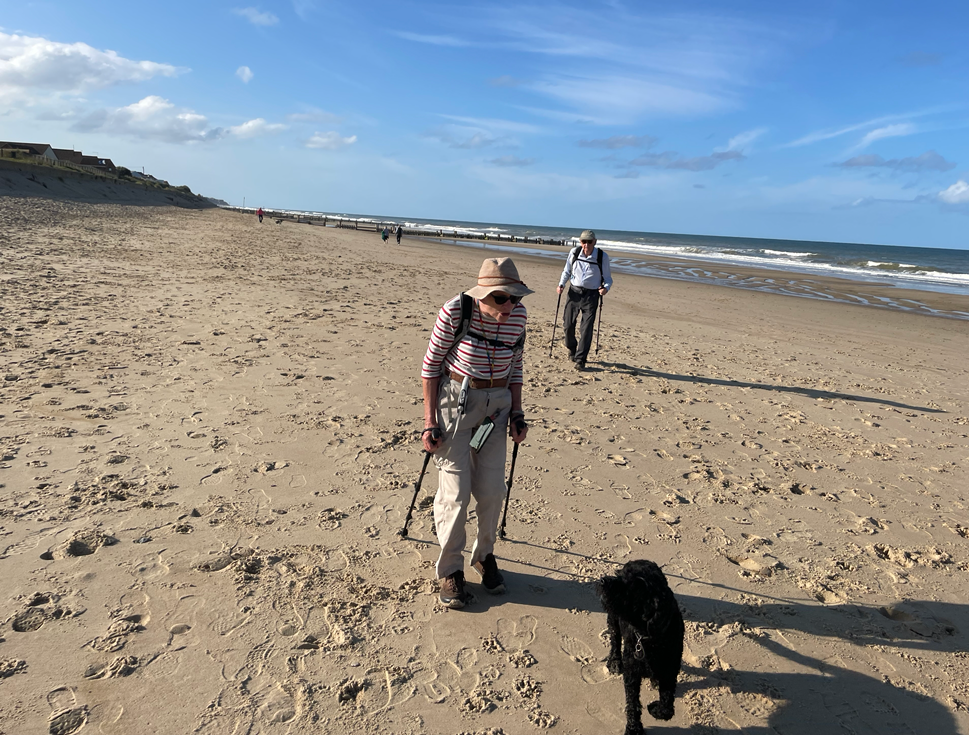Another perfect walking day overhang by clouds that look like an old tramp’s vest. The Worcester authorities should be ashamed of their neglected paths that makes walking a misery. I remember US billionaire Michael Bloomberg’s advice to all those over seventy: “always hang onto bannisters” and so Jane and I I clutch everything we can at waste height.
Acres of derelict caravan parks, miles of lovely English pasture. We are so fortunate to be alive at this hour with valuable work, and together after all these years.
Arboretum
Michael Heseltine doesn’t expect to be remembered he was once deputy Prime Minister and held many of the important offices of state. (politicians who crave “a legacy” should read Shelley’s bleak poem “Ozymandias”)
Nor, in a hundred years, does he expect to be remembered that he made a lasting impact in Liverpool and the North of England – the original levelling up – because memories are short.
Test for ZANE donors: if you doubt how short memories are: who was Prime Minister 100 years ago? – Answer: Ramsay MacDonald. I ‘ll bet you didn’t know without googling the answer which rather proves my point.
Heseltine thinks that if he is to be remembered by future generations, it will be for the trees he and his wife of sixty years, Anne, have planted. He may be right. But he was one of the heavyweights of his generation to be measured with the likes of Healey, Benn, Jenkins and more recently, Clarke and Hague. But he is the only one, I think, who can demonstrate the double whammy: building a successful business (Haymarket) from scratch, and without a whiff of scandal, as well as rising to the top of the political tree.
Our recent visit to the Thenford Arboretum was a delightful occasion: seventy acres of beautifully positioned flowers, trees, and statues and waterfalls. It is open (see site), and it is a must-visit for for your bucket list.
Undiscovered Country
You will have been appalled by the deaths in coincidental freak accidents over a few days of the vastly rich Mike Lynch – by drowning – and his accountant colleague and co-defendant, Stephen Chamberlain who was hit by a car whilst running. In June, they were both found not guilty in a US court from allegations of fraud: then… whilst celebrating…bang! And like the Titanic, Lynch’s boat, “Bayesian” was reported to be unsinkable.
Those of us who try to buttress our little lives with security, and think childishly that we are the exception to the iron rules of life, are suddenly reminded that, no matter how rich and clever we are, none of us will get out of this life alive.
Those with long memories will recall the dark film Alfie. Its theme song, by Cilla Black, asked “What’s it all about Alfeee?” Inevitably, the film left the question unanswered.
These days, even mentioning death in polite company can be deemed too morbid for modern sensibilities. Instead, people resort to euphemisms such as “She’s pushing clouds around”, or they dredge up the story of the dead waiter – “God finally caught his eye.” And so, ho ho ho, the awful mystery is reduced to something more palatable.
“We are all dead men on leave,” declared German communist revolutionary Eugene Levine as he faced death after his trial in Munich, in 1919 – but not everyone takes the subject as seriously as he did.
Death on the Prowl
The subject is shocking. I have Christian buddies with enamelled views on the certainty of heaven and eternal life – and after a great deal of reflection, I admire their convictions and wish them well.
My own views are tempered somewhat by a sermon given by the Rev Dick Lucas of St Helen’s, Bishopsgate. Once, he told us, he knocked on the door of a parishioner. It was opened by a distraught woman – she was carrying a half-naked, squirming baby in her arms, while two screaming children could be heard from the murk of her sitting room.
“I have come to discuss the Gospel and eternal life,” intoned Lucas.
“Eternal life?” the woman retorted. “I can’t think of anything worse!” Then she slammed the door in the reverend’s face.
Ever since, the endgame has seemed something beyond my radar – a deep mystery and so we must rely on Christian promises in Cor 15.
About 10 years ago, a group of our friends died suddenly. Death seemed to be sated for a while and so there was a brief pause. Then without warning, we recently lost two Tims, a Joe, a Barry and a Jinx. They were all people we dearly loved, and their deaths have been profoundly upsetting – few of them, as far as I can see, lived with much Christian conviction.
Of course, none of us is going to get out of this life alive and we all know death is on the prowl for us like a roaring lion. Yet still, I find the departure of my beloved friends bewildering. Why were they chosen to die when they did? What has happened to them? Where are they now?
Unless we have genius to elevate us to the ranks of the few immortals – the likes of Churchill, Mozart and Shakespeare – none of our lives will be remembered for long. Our work, even the “legacy” beloved by politicians pretending to be statesmen, will begin to corrode the moment we cease to be. Anyone who doubts this should read Shelley’s chilling poem “Ozymandias”. The harsh reality is that, after the funeral, our bodies will simply disappear into a grave and the waters will close over us – while the living quickly get on with their lives. And the residue? Usually a will, some fading memories and a few yellowing photos – while the dead travel to Hamlet’s “undiscovered country”, the “bourn” from which none return.
Poet Dylan Thomas proclaims we should “rage, rage against the dying of the light”. Then, in rather more gentle fashion, Edna St Vincent Millay writes:
“Into the darkness they go, the wise and the lovely
Crowned with lilies and laurel they go; but I am not resigned…
A formula, a phrase remains, – but the best is lost…
The answers quick and keen, the honest look, the laughter, the love, –
They are gone. They are gone to feed the roses…
More precious was the light in your eyes than all the roses in the world…
Quietly they go, the intelligent, the witty, the brave.
I know. But I do not approve. And I am not resigned.”
Shakespeare’s Prospero said of the mystery:
“These our actors
Are melted into air, into thin air….;
We are such stuff
As dreams are made on, and our little life
Is rounded with a sleep.”
Let us rest now. There’s no more to say.




